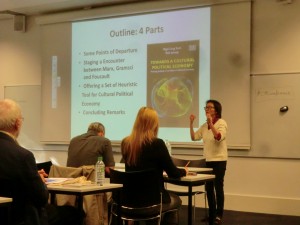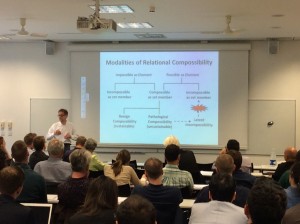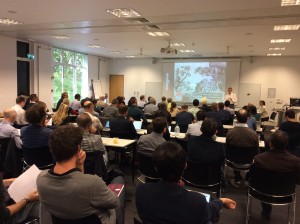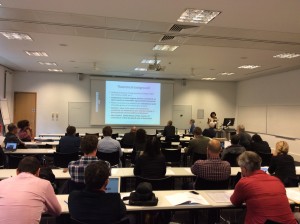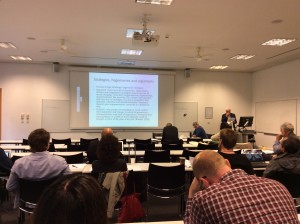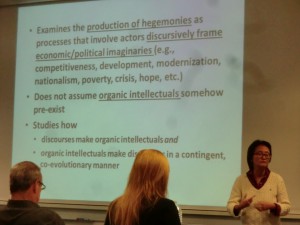The inaugural conference occurred on 1-2 September 2015, with a pre-conference welcome in the Graduate College Bar on 31 August. There were 90 participants with 69 papers in the programme, some with co-authors. The feedback to date has been uniformly excellent and there was a genuine buzz in the sessions and the informal discussions that occurred on both days. The conference ended with a summing up session (for details, see the news section link). Below are some participants’ feedback comments and some photos from the conference
| Participants’ Feedback
‘Thank you very much for this and for an excellent conference. You assembled an impressive crowd in terms of both quality and quantity.’ (Claes Belfrage, Management School, Liverpool University, UK and Felix Hauf, Political Science, Frankfurt University, Germany) ‘Many thanks for organizing an excellent conference. I had a wonderful time in Lancaster. The next ISA World Congress will be held in Toronto (2018). Was thinking the CPE team could organize a whole session, consisting of several panels, at that venue. Looking forward to taking part in many more CPE programs and activities.’ (Anisha Datta, Sociology, King’s University College at the University of Western Ontario, Canada) |
| ‘I would like to thank Bob and Ngai-Ling once again for organising the conference. It was a fantastic meeting point and I took a lot of inspirations home with me.’ (Eva Hartman, Copenhagen Business School, Denmark)
‘Thank you so much for your inspiring keynotes, excellent conference organisation and warm hospitality throughout. I am so glad to join the CPE network and look forward to further communication.’ (Terri Kim, The Cass School of Education and Communities, University of East London, UK) |
| ‘I would like to give Ngai-Ling and Bob a warm thanks for organizing and participating in a fantastic conference. It has really gotten the intellectual embers burning which I hope to put to productive work now that I am back in front of the desk in Auckland.’ (Naoise McDonagh, Sociology, University of Auckland, New Zealand)
‘Thanks again for the conference. I am very excited about the opportunities of intellectual exchange that CPE provides to students who want to study the interaction between meaning-making process and economic mechanisms; thanks for providing this environment.’ (Aykut Ozturk, Political Science, Syracuse University, USA) |
| ‘I would like to thank you, I had a great time. Thank you for the conference and your kindness.’ (Ebru Deniz Ozan, T.C. Dumlupınar University, Turkey)
‘Thank you for a great conference! I really enjoyed the challenging discussions and friendly people. I guess, from my perspective, the only thing I thought was missing was a bigger focus on discussions of the (com)possibilities of resistance and disruption “from below”. I have not read all of your book yet and don’t know to what extent you develop this in it but, regardless, I’d be really interested in discussing this more in the future.’ (Bjarke Skærlund Risager, Department of Philosophy and History of Ideas, School of Culture and Society, Aarhus University, Denmark) |
| ‘I wanted to let you know how much I loved the conference. Thank you so much for making it happen, and getting the ball rolling for future conferences.’ (Ellen Russell, Digital Media and Journalism and Society, Culture and Environment, Wilfrid Laurier University, Canada) |
1-2 September 2015 in Lancaster University
Inaugural Conference – A Collaboration between:
- Department of Politics, Philosophy and Religion, Department of Sociology, and the Cultural Political Economy Research Centre, Lancaster University
- Lancaster University Management School
- Geography Department, Sheffield University
- White Rose Social Science Doctoral Research Centre
- Graduate School of Education, Bristol University
- School of Environment, Education and Development, Manchester University
- Management School and Department of Sociology, Social Policy and Criminology, Liverpool University
- School of Law, Middlesex University
- Department of Political Science, Goethe Universität, Frankfurt am Main, Germany
- Department of Urban Studies, Malmö University, Sweden
Cultural Political Economy (CPE) is an emerging and still developing trans-disciplinary approach oriented to post-disciplinary horizons. It is concerned with making ‘cultural turns’ in the study of political economy to enhance its interpretive and explanatory power.
Intellectually CPE originated in a synthesis of critical discourse analysis, critical political economy, neo-Gramscian state theory, neo-Gramscian International Political Economy, the regulation approach, governmentality and governance studies. As such it does not add a separate realm of ‘culture’ to existing concerns with politics and economics; instead it emphasizes that the economic and political spheres are always-already cultural and that taking this into account transforms the study of political economy and cognate fields.
In this regard, CPE embraces
(a) a wide range of cultural turns (argumentative, conceptual, discursive, ideational, linguistic, narrative, rhetorical, performative, practical, reflexive, visual, etc.);
(b) numerous evolutionary and institutional approaches to political economy;
(c) evolutionary and institutional concerns with government, governmentality, and governance, with policy and governance failures, and with problems of institutional and policy design; and
(d) a commitment to dialogue with a wide range of philosophical and theoretical approaches across the humanities and social sciences and seeks to remain open to such dialogues and collaboration.
